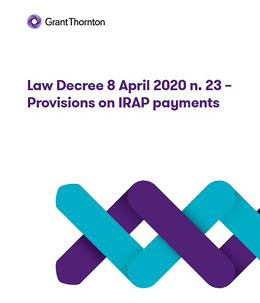-
Transactional advisory services
Find out more about the transactional advisory services of Grant Thornton Financial Advisory Services
-
Valuations
Find out more about the valuations services of Grant Thornton Financial Advisory Services
-
Mergers and acquisitions
Find out more about the merger and acquisition services of Grant Thornton Financial Advisory Services
-
Forensic and investigation services
Find out more about the forensic and investigation services of Grant Thornton Financial Advisory Services
-
Recovery & reorganisation
Find out more about the Recovery & reorganisation services of Grant Thornton Financial Advisory Services
-
Business risk services
Find out more about the business risk services of Grant Thornton Financial Advisory Services
-
Business consulting
Find out more about the business consulting services of Grant Thornton Financial Advisory Services
-
Capital market
Capital market
-
Corporate and business tax
Find out more about our corporate and business tax services.
-
Direct international tax
Find out more about our direct international tax services.
-
Global mobility services
Find out more about our global mobility services.
-
Indirect international tax
Find out more about our indirect international tax services.
-
Transfer pricing
Find out more about our transfer pricing services.
-
Litigation
Our lawyers and accountants can manage all defense measures provided not only by the Italian law, but also by EU regulations and conventions
-
Family business
Find out more about our Family business services.
-
Legal
The client can be assisted in every need and with the same care both on important operations or disputes and on simple matters

-
Back office outsourcing
Find out more about our Back office outsourcing services
-
Business process outsourcing
Find out more about our business process outsourcing services.
-
Compilation of financial statements
Find out more about our compilation of financial statements services.
-
Tax compliance
Find out more about our tax compliance services.
-
Electronic invoicing
Find out more about our electronic invoicing services
-
Electronic storage
Electronic storage is an archiving procedure that guarantees the legal validity of a digitally stored electronic document
-
Revaluation of corporate assets
Find out your civil and fiscal revaluation of tangible, intangible and financial assets
-
Payroll
Complete and customized payroll service, integrated with digital solutions and compliant with Italian and international regulations.
-
Labor consultancy
We help Italian and international companies manage all aspects of their workforce.
-
HR & Payroll Advisory Services
We review contracts, payroll, and risks for extraordinary transactions and we assess tax, labor, and safety risks in outsourcing contracts.
-
Extended services
We provide integrated digital tools to simplify HR management.
-
HR Infinity Portal
The HR Infinity Portal is Zucchetti’s platform designed to centralize communication between the company and its employees.
-
Cybersecurity
GT Digital helps clients structure information security management internal functions, also through partially or totally outsourced functions
-
Agile and Programme Management
GT Digital provides support in the adoption and implementation of different portfolio management
-
Robotic Process Automation
Our “BOT Farm” can rely on digital workers able to help clients in routine activities, allowing employees to deal with more added-value activities
-
Data strategy and management
GT Digital can support clients in seizing the opportunities offered by Big Data, from the definition of strategies to the implementation of systems
-
Enterprise Resource Planning
We support clients in selecting the most appropriate ERP System according to their specific needs, helping them also understand licensing models
-
IT strategy
GT Digital supports clients in making strategic choices, identifying innovation opportunities, comparing themselves with competitors
-
IT service management
We can support with software selection and with the implementation of dedicated tools for the management of ICT processes
-
DORA and NIS 2
The entry into force of the DORA Regulation and NIS2 represents a major step towards the creation of a harmonised regulatory framework
Premises
Article 24 provides that businesses and self-employed whose revenues or remuneration do not exceed 250 million euros are exempt from the payment of IRAP settlement due for 2019 and IRAP first advance payment instalment due for 2020. The payment of advances for FY 2019 remains due, according to ordinary rules. This provision does not apply to insurance companies, Public Administrations, financial intermediaries and holding companies.
Article 24, Law Decree 8 April 2020, no. 23 – impacts on 2019 settlement
In particular, para. 1 provides that the settlement payment of the regional tax on production activities (IRAP) relevant to FY 2019 is not due, while the advance payment relevant to the same FY remains due.
Insurance companies, public administrations, administrations of the Chamber of Deputies, of the Senate, of the Constitutional court, of the Presidency of the Republic and legislative bodies of special statute regions, as well as financial intermediaries and holding companies are excluded from the concession.
It is specified that these provisions apply in compliance with the limits and terms established by the European Commission in the “Temporary Framework for State aid measures to support the economy in the current COVID-19 outbreak”, and its following amendments.
IRAP provisions under Rilancio decree - Impact on financial statements
The Rilancio Decree, published in the Official Gazette on 19 May 2020, has a retroactive effect on the calculation of IRAP 2019 and, therefore, there are some doubts on whether such changes could impact the accounts of already closed FYs at 31 December 31 (in case the FY corresponds to the solar year).
Since the provision concerns tax issues, the reference rule is OIC accounting standard 25, which states under point 37 that current taxes are calculated based on the current tax rates at the financial statements date and, under point 38, that tax payables are posted in the financial statements at their face value, including any fines and interest accrued and due at the financial statements date.
The reference to the “financial statements date” seems to exclude that the tax payable could be influenced by a regulation that came into force after the FY closing date.
The same can be said according to OIC accounting standard no. 19, para. 24, which provides that if the reclassification of a short-term payable into a long-term payable occurs between the FY closing date and the financial statements preparation date, such payable is still classified as due within the following FY.
If significant, this event is mentioned in the explanatory notes according to the provisions of OIC accounting standard no. 29 with regard to events occurred after the FY closing date.
The same is provided under IAS 10, stating that “examples of non-adjusting events after the reporting period (…) are changes in tax rates or tax laws enacted or announced after the reporting period”. IAS 12, with reference to the definition of current tax liabilities (and assets), states that it is necessary to apply “tax rates/laws that have been enacted or substantively enacted by the end of the reporting period”.
In light of the above, it could be stated that the payable relevant to IRAP should be recognised in 2019 financial statements for its total amount, without considering the provisions under the Rilancio Decree. A contingent asset should then be registered in FY 2020, equal to the undue IRAP 2019 settlement payment.
Lastly, OIC accounting standard no. 29 seems to confirm this approach, dividing the events occurred after the FY closing date (either positive or negative ones) into three groups.
Group 1 includes events that need to be registered in the financial statements as they represent conditions that are already existing at the FY closing date; group 2 includes events that do not need to be registered in the financial statements as they represent situations arisen after the FY closing date; group 3 includes events that could impact the going concern.
Partially opposing the above conclusion, in legislative news published on 22 May 2020, Assonime (Association of Italian joint-stock companies) stated that while those companies that approved the financial statements before the coming into force of the Decree under analysis could already have attributed the total IRAP 2019 cost in the financial statements 2019, this could not be the case for those companies that opted for the possibility to approve the financial statements within the longer 180-days’ term, as some believe that these companies will not enter the cost relevant to IRAP 2019 settlement payment in the financial statements.
In other words, companies that have not yet approved the financial statements could either register the benefit in financial statements 2019 or in 2020, depending on the relevance of its effect. To support the possibility to register the benefit already in financial statements 2019, we could interpret the reference to the financial statements date in a broad perspective, since the 2020 regulation acts retroactively on 2019 regulation, providing that at that date, the settlement payment is not due and, therefore, the IRAP payable does not exist and it would be useless entering it in the financial statements.
An official clarification on this issue would be useful, it being understood that the option selected by the company is clearly explained in the explanatory notes, especially if its effects are relevant.
Article 24, Law Decree 8 April 2020, no. 23 – impacts on advance payment 2020
Para. 1 of the Decree under analysis also provides the exemption of companies from the payment of the first advance payment instalment of IRAP due for FY 2020, which is due for an amount equal to 40% for most part of companies and to 50% for those carrying out economic activities whose tax reliability indexes have been approved and whose revenues or consideration do not exceed the limit established, for each index, by the current regulation under article 12-quinquies, para. 3 and 4 of Law Decree dated 30 April 2019, no. 34.
The same exclusions provided for the exemption from the payment of IRAP 2019 settlement are also provided for the exemption from the payment of IRAP 2020 first advance.
The concession, therefore, is equal to a percentage between 40% and 50% of the tax amount relevant to the previous FY.
Given that the first advance payment of IRAP 2020 will be excluded from the calculation of the tax settlement due for the same FY, the concession will result in a final tax saving to be registered in FY 2020.
Our professionals would be pleased to provide you with any further information you may need

